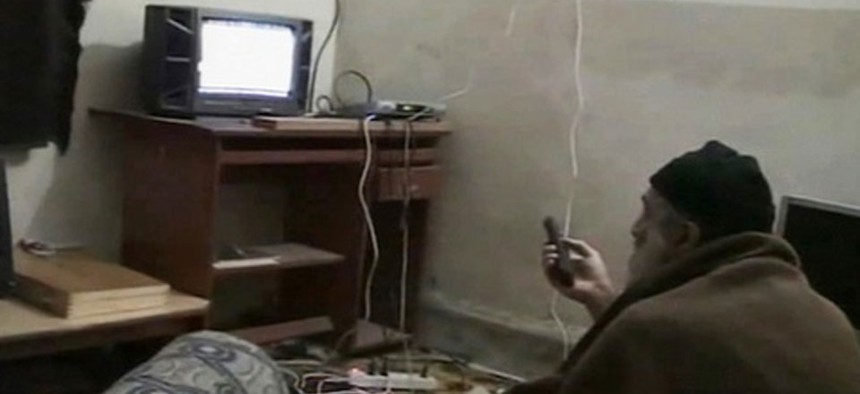
Defense Department file photo
Did a SEAL Team Six Member Violate the Espionage Act?
At the top, federal employees leak with impunity. At the bottom, they're at the mercy of an opaque apparatus that masquerades as justice.
A Navy SEAL who took part in the raid that killed Osama bin Laden is being aggressively investigated by the Obama administration, 60 Minutes reportedSunday. "I'm a senior-enlisted guy that did 13 straight deployments," Mark Owen said during an on-air interview. "Nothing else, nothing. I've sacrificed everything in my life to continue raising my hand volunteering right next to my brothers to continue to go back overseas and do what we could to help. So it's tough."
The investigation stems from a book he wrote about the raid. According to his lawyer, the government claims it violated the Espionage Act, the law used to convict Chelsea Manning. Owen says the investigation has made the last two years of his life hell. 60 Minutes suggests his problems may have begun when, on the advice of a lawyer, he didn't bother to submit his book to the government for pre-publication review, a form of censorship U.S. officials use to control what the public sees. Owen now calls that bad legal advice and says he relied on it in good faith.
* * *
While Owen is the first to be harassed by the national security state for leaking classified information about the Bin Laden raid, he is far from the first to have done so. After the raid, the Obama Administration played a cynical double-game. Officially, national security was said to require that the mission be treated with the utmost secrecy. Court battles were fought to deny Freedom of Information Act requests.
But even as government officials fought to suppress facts and images, others were using the cover of anonymity to selectively leak highly detailed accounts. There was a "cinematic" New Yorker feature, a cover story in Time magazine, and a Mark Bowden reconstruction published in the November 2012 issue ofVanity Fair.
And a Hollywood studio was working on Zero Dark Thirty, a blockbuster about the raid. The movie's release would be conveniently timed for President Obama's reelection effort. Filmmakers were given extraordinary access to details withheld from everyone else.
On June 24, 2011, former CIA Director Leon Panetta even delivered remarks to a government gathering that openly revealed classified information about the Seal Team Six raid despite the presence of one of those filmmakers in the audience. "Word that Panetta, a key member of Obama’s national security team, might have been responsible for improper disclosures without encountering any known repercussions comes as the administration faces questions over the fairness of the aggressive anti-leak investigations and prosecutions being mounted by the Justice Department," Politico reported when the incident was made public.
* * *
The U.S. government hasn't yet explained its side of the story. But this sure looks ugly. Under President Obama, if you're a torturer, you don't get interrogated or need to spend money on a personal lawyer, because the nation needs to "look forward." If you're a Wall Street executive who presided over fraudulent transactions that helped to trigger a global financial crisis, you're never held accountable. If you're a close Obama aide that commits perjury in testimony before the Senate intelligence committee, or presides over surveillance of Senate oversight efforts, there are no consequences. And if you're a former CIA director or anonymous aid who reveals classified information about the Bin Laden raid, no big deal.
But if you're an enlisted man who repeatedly risks his life going on dangerous raids that keep you far from the nexus of power and the mutual protection racket of Washington, D.C. elites, then you're investigated for violating the Espionage Act.
Then "the rule of law" suddenly requires aggressive enforcement.
"How many former secretaries of defense have written books?" Owen asked on60 Minutes. "How many former generals have written books? How many former SOCOMs, Special Operations commanders, have written books?" His interviewer replied, "So if it's fair for the generals, it should be fair for the enlisted men too?"
To which he said, "Absolutely."







